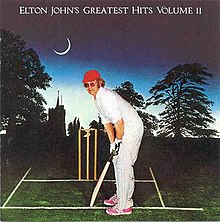Elton John's Greatest Hits Volume II
| Elton John's Greatest Hits Volume II | ||||
|---|---|---|---|---|
 |
||||
| Greatest hits album by Elton John | ||||
| Released | 13 September 1977 | |||
| Recorded | 1971, 1974–1976 | |||
| Genre | Rock | |||
| Length | 49:51 | |||
| Label |
MCA (US) DJM (UK) |
|||
| Producer | Gus Dudgeon | |||
| Elton John chronology | ||||
|
||||
| Professional ratings | |
|---|---|
| Review scores | |
| Source | Rating |
| AllMusic | |
| Robert Christgau | (B+) |
Elton John's Greatest Hits Volume II, a compilation album released in 1977, is the sixteenth official album release for Elton John. The original 1977 US version features one song from 1971 and two songs from 1974 that weren't on the first greatest hits album. It also features several hit songs from 1975 and two hit singles from Elton's last year of performing in 1976.
There are several versions of the album. There were two original versions, one in the United States and Canada and another for Great Britain and the rest of the world, both released in 1977. The British version, released on DJM Records, included "Bennie and the Jets", a song that had appeared on the 1973 album Goodbye Yellow Brick Road but had only recently been released as a single (1976) in Elton John's home country. In North America, where the album was released by MCA Records, this song had already appeared on the first volume of Greatest Hits. It was replaced with "Levon", an even older song (from 1971's Madman Across the Water album) that had not yet been collected.
The album also contained two songs that would later be replaced, "Sorry Seems to Be the Hardest Word" and "Don't Go Breaking My Heart" both from 1976. These were the newest songs on the collection, and the only two not owned by DJM/This Record Company. They had been released on Elton John's own label named The Rocket Record Company and were owned by his own royalty collection company, Sackville Productions. They appeared on this DJM album by mutual agreement. In North America, all his records were released by MCA (the singles from 1976 as well as the Blue Moves album also carried the Rocket logo), so, at that time, no agreement was necessary.
...
Wikipedia
